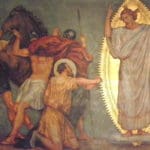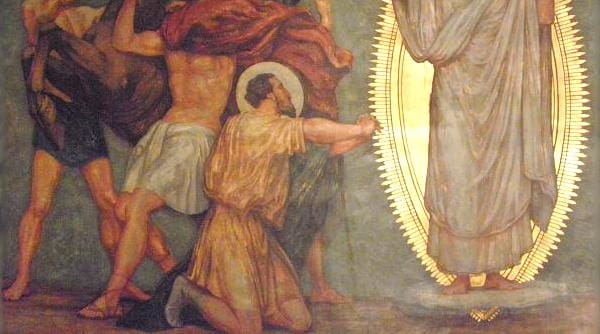Dear Father John, I am not Catholic. I consecrated myself to the Lord after reading St. Augustine’s Confessions. I was very involved with a protestant/charismatic church for many years and received much edification through those years among faithful followers.

I have tried to attend Mass many times but the service is so very different that I have a hard time adjusting to the formal ceremony as my church experience was always very different. However, several years ago I felt the Lord tell me that I needed to study the saints because there were no good examples for me in my church or life and I needed to be encouraged by the lives of the saints. This was a bit of a shock to a protestant, but I was hungry to grow and so I began my studies. No sooner had I started gleaning from the mother church when the very intense spiritual battle began. I started with JPIIs “Theology of the Body” which completely changed my life and through various trials I was led to St. John’s “Dark Night of the Soul” which I have read well over a dozen times.
The questions I have are: Do I need to become a Catholic to go to heaven? Am I missing out because I take communion at church but it is not blessed by a priest? Is it still the body and blood of Christ for me? Do I wait for a clear call to convert, or is it something I do without any conviction?
I am grateful to have found your website and I praise our Lord for your ministry.
It did my heart good to read about how powerfully God has been working in your life, and how generously you have been responding. Laus Deo! Let’s start with your second and third questions, and then cover the first and last, which are related.
Making It Real
One of the many beautiful things about the Sacrament of the Eucharist (which we receive in Holy Communion), is that it doesn’t depend upon how we feel. Whether we are tired, angry, distracted, sad, confused – whatever we are feeling, we know with certainty that Jesus is truly present in the Eucharist and that he comes to us, gladly and full of his generous grace, when we receive him in Holy Communion. One reason that Communion’s positive effect in our soul doesn’t depend on how we feel is that Christ’s presence in it is objectively real. It is not imaginary; it is not symbolic; it is not concocted by the level of our devotion. No. Jesus is truly present in the Sacrament of the Eucharist because a validly ordained priest has celebrated the highest act of worship that our Lord left his Church – the Mass. During the Mass, the priest “consecrates” the bread and wine, and through the power of the Holy Spirit they become the Body and Blood of Jesus Christ. Not just anyone can celebrate the Mass, but only a validly ordained priest (through the special graces of apostolic succession under the authority of the See of St. Peter). The Holy Spirit established that requirement precisely because he wanted us to be able to be absolutely, objectively certain that Christ is truly present in the Eucharist.
And so, although receiving communion in a non-Catholic liturgy can be an experience of true devotion and deep prayer, and that is real and important – nevertheless, you are not receiving the Body and Blood of our Lord as you can in the Catholic Church, and so you are not receiving the sacramental grace that comes with it. (If you were a member of an Orthodox Church, the situation would be a bit different.) I hope this doesn’t discourage you. God has given you a mighty thirst for deeper intimacy with him. And he is guiding you closer and closer to his most Sacred Heart. Even inspiring you to ask this question is a step towards that deeper intimacy. If you want to read a bit more about this, you can look at our earlier blog post here, and also at this short essay.
What’s the Next Step?
And that leads us on to your question about converting to Catholicism. You certainly should not convert to Catholicism if you have not come to the conviction that the Catholic Church is the Church that Christ founded, and the Church with the fullness of truth and grace. But you don’t have to sit around and wait passively for that conviction to come to you. It may come in a flash – that would be a special grace. Usually, though, conversion is a journey, a journey in which the Holy Spirit guides you into a deeper and deeper friendship with Jesus. And you get to the point where, because you love Jesus so much, you want to receive all that he wants to give you – including the unique guidance, grace, and fellowship that his Catholic Church offers. When non-Catholic Christians become Catholics, they leave nothing behind, they just get more stuff!
So what should you do? Just continue asking yourself, “What is the next step I can take to continue along this journey?” If you keep following one next step after another, generously and courageously, the Holy Spirit will guide you surely into the very center of the burning fire of love of the Sacred Heart of Jesus. One possible next step for you could be to read about the journeys of other non-Catholic Christians who have become Catholics. (You can find a lot of these stories in the series of books edited by Patrick Madrid called “Surprised by Truth,” and also at the website of The Coming Home Network.) You can watch Dan’s conversion testimony here. I invite our other readers to share their own thoughts on possible “next steps.”
Getting to Heaven
Do you need to be a Catholic to go to heaven? Well, we can look at this from a couple of different perspectives. On the one hand, we can say that everyone in heaven is Catholic, because the Catholic Church is the Body of Christ and the family of God, and in heaven everyone will be members of the same family. But everyone who dies and goes to heaven isn’t necessarily and formally a member of the Catholic Church. If God gave them sufficient light to see clearly that the Catholic Church was his true Church, and they purposely and repeatedly rejected that light and refused to become Catholic and never repented, then God will certainly not force them to live in his family for all eternity – he respects our freedom. Here is how the Catholic Catechism puts it (quoting one of the Church Councils):
846 …Basing itself on Scripture and Tradition, the Council teaches that the Church, a pilgrim now on earth, is necessary for salvation: the one Christ is the mediator and the way of salvation; he is present to us in his body which is the Church. He himself explicitly asserted the necessity of faith and Baptism, and thereby affirmed at the same time the necessity of the Church which men enter through Baptism as through a door. Hence they could not be saved who, knowing that the Catholic Church was founded as necessary by God through Christ, would refuse either to enter it or to remain in it.
847 This affirmation is not aimed at those who, through no fault of their own, do not know Christ and his Church: Those who, through no fault of their own, do not know the Gospel of Christ or his Church, but who nevertheless seek God with a sincere heart, and, moved by grace, try in their actions to do his will as they know it through the dictates of their conscience – those too may achieve eternal salvation.
848 Although in ways known to himself God can lead those who, through no fault of their own, are ignorant of the Gospel, to that faith without which it is impossible to please him, the Church still has the obligation and also the sacred right to evangelize all men.
I truly hope this answer has given you some light and some encouragement. We are so glad to have you among our readers! I personally will pray for you and for your journey to continue all the way to the heights of intimacy with the One Who loves you more than you can imagine.
+
Art for this post on conversion to Catholicism: Conversion de Paul, Fresque du chœur de l’église Saint-Paul de Lyon (Conversion of Paul, Fresco of the Choir of the Church of Saint Paul de Lyon), no author listed, GO69, 5 November 2010 own work, PD-Worldwide, Wikimedia Commons.


